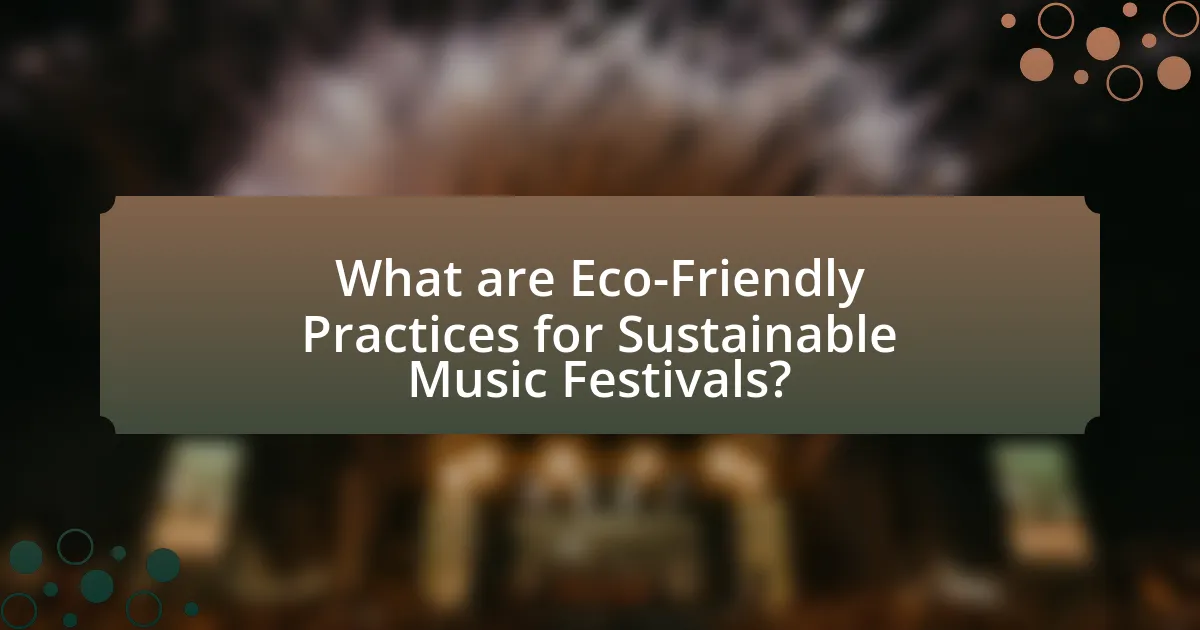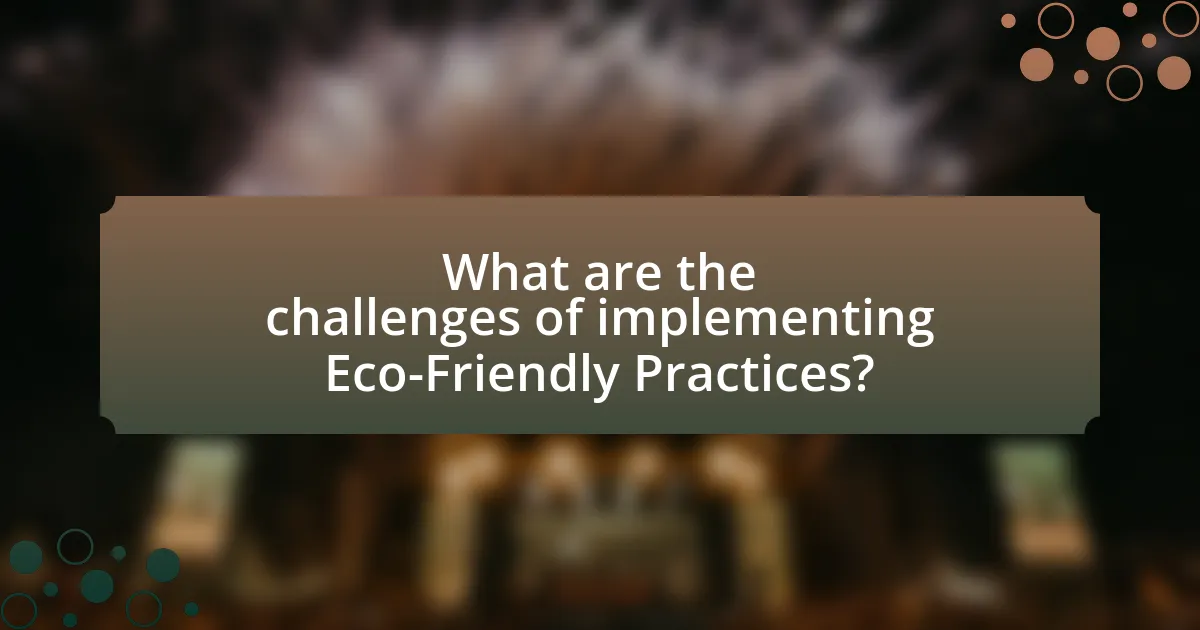Eco-friendly practices for sustainable music festivals encompass waste reduction, renewable energy utilization, and sustainable transportation options. These initiatives, such as recycling, composting, and the use of solar power, significantly minimize environmental impact and promote sustainability. The article highlights the importance of these practices, their long-term benefits, and successful examples from festivals like Glastonbury and Coachella. It also addresses challenges faced by organizers, strategies for implementation, and the role of community engagement and technology in enhancing sustainability efforts.

What are Eco-Friendly Practices for Sustainable Music Festivals?
Eco-friendly practices for sustainable music festivals include waste reduction, renewable energy use, and sustainable transportation options. Waste reduction can be achieved through initiatives like recycling and composting, which help divert significant amounts of waste from landfills; for example, festivals like Glastonbury have reported recycling rates of over 50%. Utilizing renewable energy sources, such as solar or wind power, minimizes carbon footprints; Coachella has implemented solar panels to power stages, reducing reliance on fossil fuels. Additionally, promoting sustainable transportation, such as carpooling or public transit, encourages attendees to reduce their carbon emissions; studies show that festivals that incentivize public transport can decrease individual vehicle use by up to 30%. These practices collectively contribute to a more sustainable festival experience.
Why are Eco-Friendly Practices important for Music Festivals?
Eco-friendly practices are important for music festivals because they significantly reduce environmental impact and promote sustainability. Implementing these practices helps minimize waste, conserve resources, and lower carbon emissions associated with large gatherings. For instance, festivals that adopt recycling and composting initiatives can divert up to 70% of waste from landfills, as demonstrated by the Glastonbury Festival, which has achieved a 50% waste diversion rate through such measures. Additionally, using renewable energy sources, like solar power, can decrease reliance on fossil fuels, further contributing to a festival’s sustainability goals.
How do Eco-Friendly Practices impact the environment during festivals?
Eco-friendly practices significantly reduce environmental impact during festivals by minimizing waste, conserving resources, and lowering carbon emissions. For instance, implementing recycling and composting programs can divert up to 75% of waste from landfills, as demonstrated by the 2019 Coachella Valley Music and Arts Festival, which achieved a 90% waste diversion rate through such initiatives. Additionally, using renewable energy sources, like solar power, can decrease reliance on fossil fuels, contributing to a reduction in greenhouse gas emissions. Studies show that festivals adopting these practices not only enhance sustainability but also promote awareness among attendees, fostering a culture of environmental responsibility.
What are the long-term benefits of adopting Eco-Friendly Practices?
Adopting eco-friendly practices leads to significant long-term benefits, including reduced environmental impact, cost savings, and enhanced community reputation. By minimizing waste and energy consumption, festivals can lower their carbon footprint, contributing to climate change mitigation. For instance, a study by the Green Music Initiative found that implementing sustainable practices can reduce waste by up to 70% at music festivals. Additionally, eco-friendly initiatives often result in lower operational costs over time, as energy-efficient technologies and waste reduction strategies decrease expenses. Furthermore, festivals that prioritize sustainability can attract a larger audience and foster positive community relations, as consumers increasingly prefer environmentally responsible events.
What are the key components of Eco-Friendly Practices in Music Festivals?
The key components of eco-friendly practices in music festivals include waste management, sustainable transportation, energy efficiency, and water conservation. Effective waste management involves implementing recycling and composting programs to minimize landfill contributions; for instance, festivals like Glastonbury have achieved over 50% waste diversion rates. Sustainable transportation encourages the use of public transit, carpooling, and biking, reducing carbon footprints; events such as Coachella promote shuttle services to decrease vehicle emissions. Energy efficiency is achieved through the use of renewable energy sources, like solar panels, which have been utilized by festivals such as Bonnaroo to power stages and facilities. Lastly, water conservation practices, including the use of water refill stations and eco-friendly restrooms, help to reduce water waste, as seen in festivals like Lollapalooza. These components collectively contribute to the overall sustainability of music festivals.
What types of waste management strategies are implemented?
Waste management strategies implemented at eco-friendly music festivals include recycling, composting, waste reduction, and the use of biodegradable materials. Recycling involves the separation and processing of materials like plastics, metals, and paper to reduce landfill waste. Composting transforms organic waste into nutrient-rich soil, promoting sustainability. Waste reduction focuses on minimizing waste generation through measures such as digital ticketing and reusable containers. Additionally, biodegradable materials are utilized to ensure that waste decomposes naturally, further reducing environmental impact. These strategies collectively contribute to the overall goal of sustainability in festival settings.
How is energy consumption reduced at music festivals?
Energy consumption at music festivals is reduced through the implementation of renewable energy sources, energy-efficient technologies, and sustainable practices. Many festivals now utilize solar panels and wind turbines to power stages and facilities, significantly decreasing reliance on fossil fuels. For instance, the Coachella Valley Music and Arts Festival has incorporated solar energy to power its operations, resulting in a substantial reduction in carbon emissions. Additionally, energy-efficient lighting and sound systems are employed to minimize electricity usage. According to a report by the Green Music Initiative, festivals that adopt these eco-friendly measures can reduce their energy consumption by up to 50%.
How can festival organizers implement Eco-Friendly Practices?
Festival organizers can implement eco-friendly practices by prioritizing waste reduction, utilizing renewable energy sources, and promoting sustainable transportation options. For instance, they can establish recycling and composting stations throughout the festival grounds to minimize landfill waste, as evidenced by events like the Glastonbury Festival, which achieved a 50% waste diversion rate through such initiatives. Additionally, using solar panels or wind turbines for power can significantly reduce carbon footprints, as demonstrated by the Coachella Valley Music and Arts Festival, which has incorporated solar energy into its operations. Furthermore, encouraging attendees to use public transport, carpool, or bike to the event can lower greenhouse gas emissions, with studies showing that festivals that promote these options see a notable decrease in traffic-related pollution.
What role do partnerships with local businesses play?
Partnerships with local businesses play a crucial role in enhancing the sustainability of music festivals. These collaborations facilitate the sourcing of eco-friendly products and services, such as biodegradable materials and local food vendors, which significantly reduce the festival’s carbon footprint. For instance, a study by the Green Music Initiative found that festivals that partnered with local suppliers reduced waste by up to 30% compared to those relying on distant suppliers. Additionally, local businesses often have a vested interest in promoting sustainable practices, which can lead to innovative solutions and community engagement, further amplifying the festival’s environmental impact.
How can technology enhance sustainability efforts?
Technology can enhance sustainability efforts by optimizing resource management and reducing waste. For instance, smart energy systems can monitor and adjust energy consumption in real-time, leading to a reduction in carbon emissions. According to a study by the International Energy Agency, implementing smart grid technology can decrease energy losses by up to 30%. Additionally, digital ticketing and cashless payment systems minimize paper waste and streamline transactions, contributing to a more sustainable event experience. Furthermore, data analytics can help organizers track resource usage and identify areas for improvement, ultimately fostering more eco-friendly practices at music festivals.

What are the challenges of implementing Eco-Friendly Practices?
The challenges of implementing eco-friendly practices in sustainable music festivals include high initial costs, logistical complexities, and resistance from stakeholders. High initial costs arise from the investment needed for sustainable infrastructure, such as renewable energy sources and waste management systems. Logistical complexities involve coordinating transportation, waste disposal, and resource management while ensuring minimal environmental impact. Resistance from stakeholders, including vendors and attendees, can hinder the adoption of eco-friendly practices due to a lack of awareness or perceived inconvenience. These challenges are supported by studies indicating that financial barriers and stakeholder engagement are critical factors in the successful implementation of sustainability initiatives in large events.
What common obstacles do organizers face?
Organizers of eco-friendly music festivals commonly face obstacles such as budget constraints, logistical challenges, and stakeholder engagement issues. Budget constraints limit the ability to implement sustainable practices, as eco-friendly materials and technologies often come at a higher cost. Logistical challenges arise from the need to coordinate waste management, transportation, and energy sources that align with sustainability goals. Additionally, engaging stakeholders, including vendors, sponsors, and attendees, can be difficult, as not all parties may prioritize or understand the importance of eco-friendly practices. These obstacles are supported by industry reports indicating that financial limitations and stakeholder buy-in are significant barriers to implementing sustainable initiatives in event planning.
How can budget constraints affect sustainability initiatives?
Budget constraints can significantly limit the scope and effectiveness of sustainability initiatives. When financial resources are restricted, organizations may prioritize immediate operational needs over long-term sustainability goals, leading to reduced investment in eco-friendly technologies and practices. For instance, a study by the International Journal of Sustainability in Higher Education found that institutions facing budget cuts often scaled back their sustainability programs, resulting in decreased energy efficiency and increased waste generation. This demonstrates that limited funding can hinder the implementation of critical sustainability measures, ultimately compromising environmental objectives.
What are the logistical challenges in waste management?
Logistical challenges in waste management include inefficient collection systems, inadequate infrastructure, and limited recycling capabilities. Inefficient collection systems can lead to delays and increased costs, as seen in urban areas where waste is not collected regularly, resulting in overflow and contamination. Inadequate infrastructure, such as insufficient waste processing facilities, hampers the ability to manage waste effectively, particularly in regions with high event attendance like music festivals. Limited recycling capabilities further complicate waste management, as many materials are not processed due to a lack of facilities or technology, leading to increased landfill use. These challenges necessitate strategic planning and investment to improve waste management systems, especially in the context of large gatherings.
How can these challenges be overcome?
To overcome challenges in implementing eco-friendly practices for sustainable music festivals, organizers can adopt comprehensive waste management systems. These systems should include recycling and composting stations strategically placed throughout the venue, which can significantly reduce landfill waste. For instance, festivals like Glastonbury have successfully implemented such systems, achieving a 50% reduction in waste sent to landfills by promoting recycling and composting. Additionally, utilizing renewable energy sources, such as solar panels, can mitigate carbon emissions associated with festival operations. Research indicates that festivals powered by renewable energy can reduce their carbon footprint by up to 80%. Engaging attendees through educational campaigns about sustainability can further enhance participation in eco-friendly initiatives, leading to a more environmentally conscious festival culture.
What strategies can be employed to secure funding for sustainability?
To secure funding for sustainability, organizations can employ strategies such as developing partnerships with corporate sponsors, applying for grants, and utilizing crowdfunding platforms. Corporate sponsorships can provide significant financial support, especially when companies align their brand with sustainability initiatives, as seen in events like the Coachella Valley Music and Arts Festival, which has partnered with eco-conscious brands. Additionally, grants from government agencies and non-profit organizations specifically aimed at environmental projects can be accessed; for instance, the Environmental Protection Agency offers various grants for sustainability efforts. Crowdfunding platforms like Kickstarter have also proven effective, allowing individuals and organizations to raise funds directly from supporters who are passionate about sustainability, as demonstrated by successful campaigns for eco-friendly products and initiatives.
How can community engagement improve Eco-Friendly Practices?
Community engagement can significantly improve eco-friendly practices by fostering collective responsibility and awareness among participants. When communities actively participate in sustainability initiatives, they are more likely to adopt environmentally friendly behaviors, such as reducing waste and conserving resources. For instance, a study by the University of California found that community-led recycling programs increased recycling rates by up to 30% compared to traditional methods. Engaging local stakeholders in decision-making processes also ensures that eco-friendly practices are tailored to the specific needs and values of the community, leading to higher compliance and effectiveness.

What are some successful examples of Eco-Friendly Music Festivals?
Some successful examples of eco-friendly music festivals include Glastonbury Festival, Coachella, and Shambhala Music Festival. Glastonbury Festival, held in the UK, has implemented extensive recycling programs and uses renewable energy sources, achieving a 50% reduction in waste sent to landfills. Coachella, located in California, has introduced initiatives like carpooling incentives and solar-powered stages, significantly lowering its carbon footprint. Shambhala Music Festival in Canada emphasizes sustainability through its zero waste policy, composting, and local food sourcing, resulting in over 90% of waste being diverted from landfills. These festivals demonstrate effective eco-friendly practices that contribute to sustainability in the music industry.
What practices have been adopted by leading sustainable festivals?
Leading sustainable festivals have adopted practices such as waste reduction, renewable energy use, and sustainable sourcing of materials. For instance, festivals like Glastonbury implement extensive recycling programs, aiming for a 50% reduction in waste sent to landfills. Additionally, Coachella utilizes solar panels to power stages, significantly decreasing its carbon footprint. Furthermore, many festivals prioritize local and organic food vendors, which supports local economies and reduces transportation emissions. These practices are validated by the increasing number of festivals committing to sustainability, with over 1,000 events participating in the Green Music Initiative, showcasing a collective effort towards eco-friendly operations.
How do these festivals measure their environmental impact?
Festivals measure their environmental impact through various metrics, including carbon footprint assessments, waste management analysis, and resource consumption tracking. For instance, many festivals conduct carbon footprint calculations by evaluating energy usage, transportation emissions, and waste generated during the event. Additionally, they often implement waste audits to quantify the amount of recyclable, compostable, and landfill waste produced, allowing for improvements in waste management strategies. Some festivals also track water usage and assess the ecological impact on local biodiversity, ensuring that their operations align with sustainability goals. These methods provide concrete data that help festivals understand their environmental footprint and make informed decisions for future events.
What innovative solutions have been implemented in these festivals?
Innovative solutions implemented in eco-friendly music festivals include the use of renewable energy sources, such as solar and wind power, to reduce carbon footprints. For example, festivals like Coachella have incorporated solar panels to power stages and facilities, significantly decreasing reliance on fossil fuels. Additionally, many festivals have adopted waste reduction strategies, including composting and recycling programs, which have led to a reported 70% reduction in waste at events like Glastonbury. Furthermore, the introduction of digital ticketing and cashless payment systems minimizes paper waste and enhances efficiency. These practices demonstrate a commitment to sustainability while maintaining the festival experience.
What lessons can be learned from these examples?
Lessons learned from eco-friendly practices at sustainable music festivals include the importance of waste reduction, community engagement, and renewable energy use. Implementing comprehensive recycling and composting programs significantly decreases landfill waste, as evidenced by festivals that have achieved over 90% waste diversion rates. Engaging local communities fosters support and participation, enhancing the festival experience while promoting local culture and economy. Utilizing renewable energy sources, such as solar and wind, reduces carbon footprints, with some festivals reporting up to 100% energy sourced from renewables. These practices demonstrate that sustainability can be effectively integrated into large-scale events, benefiting both the environment and the festival’s overall success.
How can smaller festivals replicate these successful practices?
Smaller festivals can replicate successful eco-friendly practices by adopting strategies such as waste reduction, local sourcing, and community engagement. For instance, implementing a comprehensive recycling and composting program can significantly minimize landfill waste, as demonstrated by larger festivals that have achieved up to 90% waste diversion rates. Additionally, sourcing food and materials from local vendors not only reduces carbon footprints but also supports the local economy, a practice seen in festivals like Bonnaroo, which emphasizes local partnerships. Engaging the community through volunteer programs fosters a sense of ownership and responsibility towards sustainability, as evidenced by festivals that have successfully mobilized local volunteers to enhance their environmental initiatives.
What resources are available for festival organizers seeking to go green?
Festival organizers seeking to go green can access a variety of resources, including sustainability guides, eco-certification programs, and partnerships with environmental organizations. For instance, the Green Music Initiative provides a comprehensive toolkit that includes best practices for reducing waste and energy consumption at events. Additionally, organizations like A Greener Festival offer certification programs that help festivals measure and improve their environmental impact. Research from the International Festivals & Events Association highlights that implementing sustainable practices can lead to cost savings and enhanced attendee experience, reinforcing the importance of these resources for effective green initiatives.
What are some practical tips for organizing an Eco-Friendly Music Festival?
To organize an eco-friendly music festival, implement waste reduction strategies, such as providing recycling and composting stations throughout the venue. This approach minimizes landfill waste and encourages attendees to dispose of materials responsibly. Additionally, utilize renewable energy sources, like solar or wind power, to reduce the festival’s carbon footprint. According to the U.S. Department of Energy, renewable energy can significantly lower greenhouse gas emissions compared to fossil fuels. Furthermore, promote sustainable transportation options by encouraging carpooling, providing shuttle services, or partnering with local public transit to reduce vehicle emissions. Engaging local vendors who prioritize sustainable practices can also enhance the festival’s eco-friendly profile, as they often use locally sourced materials and minimize packaging waste.
